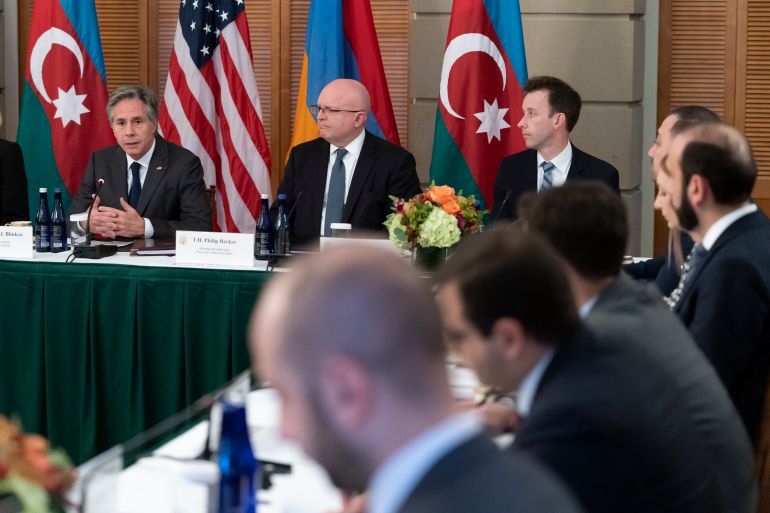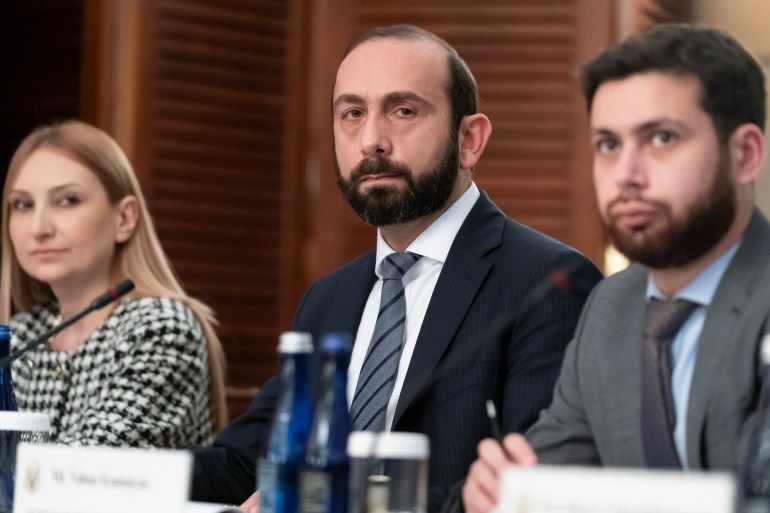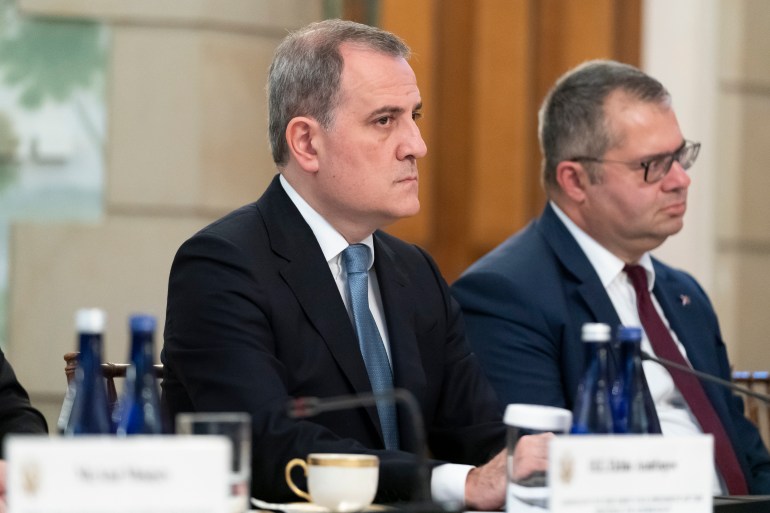US hosts talks between Armenia, Azerbaijan’s foreign ministers
Antony Blinken praises Yerevan and Baku for taking ‘courageous steps’ towards a durable peace as he hosts meeting in Washington, DC.

US Secretary of State Antony Blinken has hosted talks between the foreign ministers of Armenia and Azerbaijan, praising the rival nations that have repeatedly clashed over the Nagorno-Karabakh region for taking “courageous steps” towards a durable peace.
Blinken met Armenian foreign minister Ararat Mirzoyan and his Azerbaijani counterpart Jeyhun Bayramov at Blair House, a state guest house in Washington, DC, on Monday, just weeks after the worst fighting between the two countries since a 2020 war.
Keep reading
list of 4 itemsArmenian PM Pashinyan in Iran after meeting with Putin, Aliyev
Iran opens mission in strategic Armenia region as it expands ties
Armenia, Azerbaijan agree to civilian EU mission alongside border
“What we are seeing now are real steps and courageous steps by both countries to put the past behind and to work toward a durable peace,” Blinken said in public comments opening the meeting.
The top US diplomat said the talks would build on earlier discussions at the United Nations General Assembly in New York and other conversations between officials from Armenia, Azerbaijan and the US.
“The United States as a friend to both Armenia and Azerbaijan is committed to doing everything that we can to support you in this effort,” he said. “Direct dialogue is the best way to a truly durable peace, and we are very pleased to support that.”
The rest of the meeting was being held behind closed doors.


A US official, who spoke to the AFP news agency on condition of anonymity, said the meeting was less about peace negotiations in the full sense of the term, and more about providing an opportunity for the rival parties to meet and talk.
A week ago, Armenian Prime Minister Nikol Pashinyan and Azerbaijani President Ilham Aliyev “agreed not to use force” to resolve their dispute over the territory of Nagorno-Karabakh during a summit in Russia hosted by President Vladimir Putin.
However, in the early hours of Monday, Azerbaijani forces opened fire on Armenian positions in the eastern sector of the Armenian-Azerbaijani border, the defence ministry in Yerevan said in a statement, adding there had been no casualties. Meanwhile, Azerbaijan’s defence ministry accused Armenian forces of shooting at the positions of Azerbaijani troops stationed at several locations on the frontier.
Kremlin spokesman Dmitry Peskov on Monday called on both parties to “refrain from the actions and steps that could lead to an escalation of tensions”.
The two sides earlier in October agreed to a European Union mission alongside their shared border.
Armenia and Azerbaijan fought two wars over the disputed territory of Nagorno-Karabakh – in the autumn of 2020 and in the 1990s.
Six weeks of fighting in 2020 killed more than 6,500 people before a Russian-brokered truce ended the hostilities.
Under the 2020 deal, Armenia ceded swaths of territory it had controlled for decades, and Russia stationed peacekeepers to oversee the fragile ceasefire. There have been frequent exchanges of fire at the Caucasus neighbours’ border since the 2020 war.
In September, more than 280 people from both sides were killed in new clashes.
When the Soviet Union collapsed in 1991, ethnic Armenian separatists in Nagorno-Karabakh broke away from Azerbaijan. About 30,000 people were killed in the ensuing conflict.